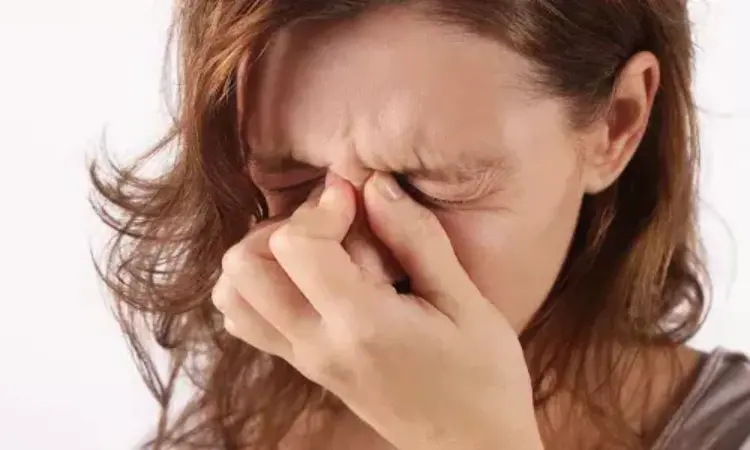- Home
- Medical news & Guidelines
- Anesthesiology
- Cardiology and CTVS
- Critical Care
- Dentistry
- Dermatology
- Diabetes and Endocrinology
- ENT
- Gastroenterology
- Medicine
- Nephrology
- Neurology
- Obstretics-Gynaecology
- Oncology
- Ophthalmology
- Orthopaedics
- Pediatrics-Neonatology
- Psychiatry
- Pulmonology
- Radiology
- Surgery
- Urology
- Laboratory Medicine
- Diet
- Nursing
- Paramedical
- Physiotherapy
- Health news
- Fact Check
- Bone Health Fact Check
- Brain Health Fact Check
- Cancer Related Fact Check
- Child Care Fact Check
- Dental and oral health fact check
- Diabetes and metabolic health fact check
- Diet and Nutrition Fact Check
- Eye and ENT Care Fact Check
- Fitness fact check
- Gut health fact check
- Heart health fact check
- Kidney health fact check
- Medical education fact check
- Men's health fact check
- Respiratory fact check
- Skin and hair care fact check
- Vaccine and Immunization fact check
- Women's health fact check
- AYUSH
- State News
- Andaman and Nicobar Islands
- Andhra Pradesh
- Arunachal Pradesh
- Assam
- Bihar
- Chandigarh
- Chattisgarh
- Dadra and Nagar Haveli
- Daman and Diu
- Delhi
- Goa
- Gujarat
- Haryana
- Himachal Pradesh
- Jammu & Kashmir
- Jharkhand
- Karnataka
- Kerala
- Ladakh
- Lakshadweep
- Madhya Pradesh
- Maharashtra
- Manipur
- Meghalaya
- Mizoram
- Nagaland
- Odisha
- Puducherry
- Punjab
- Rajasthan
- Sikkim
- Tamil Nadu
- Telangana
- Tripura
- Uttar Pradesh
- Uttrakhand
- West Bengal
- Medical Education
- Industry
Women More Likely to Develop Chronic Rhinosinusitis Without Polyps, Finds New Study

USA: A new study published in JAMA Otolaryngology-Head & Neck Surgery highlights that biological sex plays a key role in the diagnosis and inflammatory profile of chronic rhinosinusitis (CRS).
The research by Richard G. Chiu from the Department of Otolaryngology, College of Medicine, University of Illinois, Chicago, and colleagues found that women are significantly more likely to develop chronic rhinosinusitis without nasal polyps (CRSsNP) but less likely to experience chronic rhinosinusitis with nasal polyps (CRSwNP) compared to men.
The findings are based on a comprehensive analysis of data from the All of Us Research Program, a large-scale U.S. national database that includes participants from diverse healthcare settings such as academic hospitals, Veterans Affairs facilities, and community health centers. The study evaluated 258,245 adults from 2018 to 2023, of whom 61.6% were female and 38.4% were male, with more than half aged over 50 years.
The study revealed the following findings:
- Women under 60 years had 44% higher odds of being diagnosed with CRSsNP (OR 1.44).
- Women aged 60 years or older had a 32% higher likelihood of CRSsNP diagnosis (OR 1.32).
- Women had a 37% lower chance of being diagnosed with CRSwNP compared with men (OR 0.63).
- Biomarker analysis showed that women had lower serum eosinophil counts and reduced IgE levels, indicating a tendency toward non–type 2 inflammation.
- An age-related decline in CRSsNP prevalence was noted among women over 60, despite higher rates in younger women.
- The association between female sex and CRSsNP weakened with advancing age, showing a negative interaction effect between sex and older age.
These findings reinforce the role of sex-based immunological differences in shaping inflammatory diseases like CRS. “A better understanding of biological sex-based differences in the development of CRS would enable better therapeutic strategies and public health approaches to address this condition,” the authors wrote.
The researchers noted several limitations, including the study’s cross-sectional design, which restricts causal interpretation, and a sex imbalance, as women comprised nearly two-thirds of participants. CRS diagnoses were based on medical records rather than CT or endoscopy, possibly causing misclassification. Moreover, the lower-than-expected CRSwNP prevalence suggests potential underreporting in the dataset.
The large-scale study provides valuable insight into how biological sex influences CRS diagnosis and inflammatory patterns. The findings highlight that women are more prone to CRSsNP, while men are more likely to develop CRSwNP, with distinct immune marker differences between the sexes. Understanding these sex-related variations could pave the way for more personalized treatment strategies and improved clinical management of chronic rhinosinusitis.
Reference:
Chiu RG, Ahn A, Eldeirawi K, et al. Biological Sex and Chronic Rhinosinusitis Diagnosis and Biomarkers. JAMA Otolaryngol Head Neck Surg. Published online October 23, 2025. doi:10.1001/jamaoto.2025.3734
Dr Kamal Kant Kohli-MBBS, DTCD- a chest specialist with more than 30 years of practice and a flair for writing clinical articles, Dr Kamal Kant Kohli joined Medical Dialogues as a Chief Editor of Medical News. Besides writing articles, as an editor, he proofreads and verifies all the medical content published on Medical Dialogues including those coming from journals, studies,medical conferences,guidelines etc. Email: drkohli@medicaldialogues.in. Contact no. 011-43720751
Next Story


